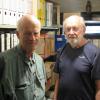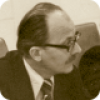History of IAMCR
This section guides you to the historical development of the IAMCR from a European-American initiative of journalism and mass communication scholars, promoted by Unesco since the late 1940s, to a worldwide association of media and communication academics in the new millennium. In it you will find the History in a Nutshell and a longer article, Overview of IAMCR History, both by Cees Hamelink, former President, and Kaarle Nordenstreng, former Vice-President.
A pictorial publication by the same authors, entitled IAMCR in Retrospect and published in 2007 at the 50th anniversary conference in Paris as a printed publication, is available online here. You can access it via the menu on the right or download it as a PDF file: IAMCR in Retrospect (4.2 MB)
An introductory booklet by Hamelink and Nordenstreng is available as PDF file: Basics of IAMCR History - third edition, September 2022.
See also Michael Meyen: The IAMCR Story. In: Michael Meyen/Thomas Wiedemann (Hrsg.): Biografisches Lexikon der Kommunikationswissenschaft. Köln: Herbert von Halem 2018. http://blexkom.halemverlag.de/iamcr-story/ (23/01/2022).
In addition, three accounts are given in this page by key witnesses: founder member Hifzi Topuz, member since the 1960s, Walery Pisarek and former President Hamid Mowlana.
Moreover, for all interested researchers and students a digital archive of the most essential IAMCR documentation is accessible. A comprehensive hard copy archive of these documents is placed in the Unesco Archives in Paris.
The archive has been arranged by Hamelink and Nordenstreng, who have been working for several years on a book on the history of IAMCR. It is expected to be completed in 2023.
The history of the IAMCR goes back to the first years of Unesco. Its Committee on Technical Needs in the Mass Media drafted in 1946 a constitution for an “International Institute of the Press and information, designed to promote the training of journalists and the study of press problems throughout the world”.
We present here the English version of an article published in Spanish in the journal Disertaciones, special issue on "Communication Research: history, current situation and prospective", edited by Miguel Vicente and Manuel Martinez Nicolas. Both versions are available below as pdf files.
In a speech given on the occasion of IAMCR's 40th anniversary meeting, at the 1997 meeting in Oaxaca, Mexico, Mowlana offered his personal reflections on IAMCR's history; "gathered through my membership in and association with IAMCR for over thirty years, especially over the last two decades when I served on its international Council and the Executive Board as Vice President and President respectively."
In 1957, I was president of the Union of Journalists in Istanbul and editor in chief of the Turkish daily paper, Aksam. The Turkish National Commission for UNESCO asked me to take part in the first course of the International Centre for Higher Education in Journalism which had just been created in Strasbourg.
It all began with the conference on methods of journalists' training in Paris in April 1956, organized by UNESCO with the participation of representatives of 31 countries. It was chaired by the director of the Carleton College School of Journalism in Ottawa, Professor Wilfred Eggleston. After the conference of journalism teaching experts, a meeting of media researchers was held in a narrower circle.






